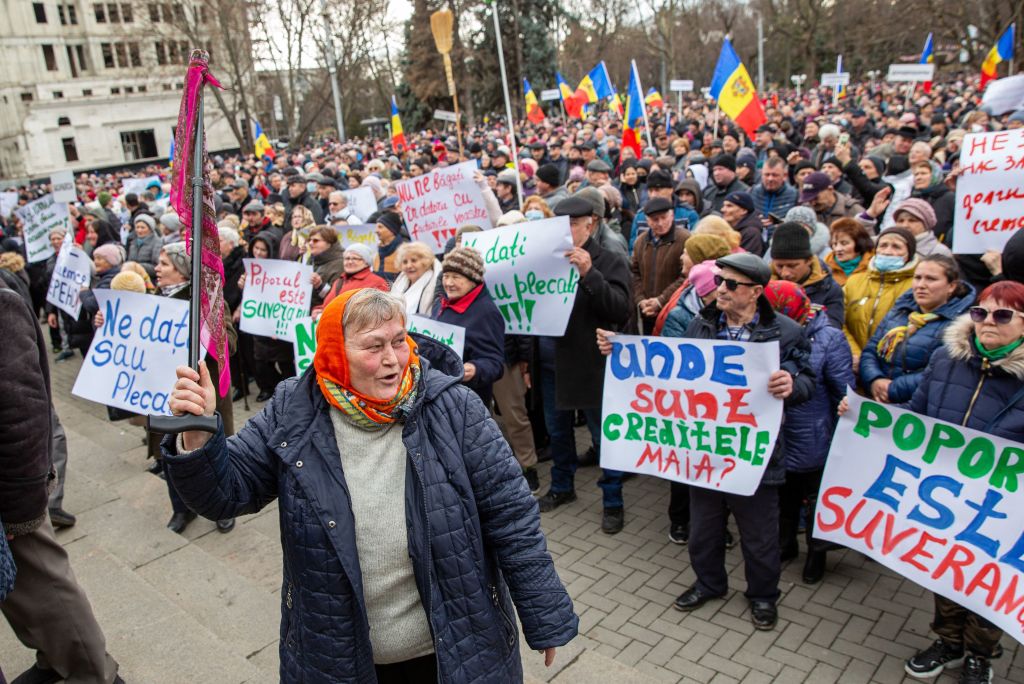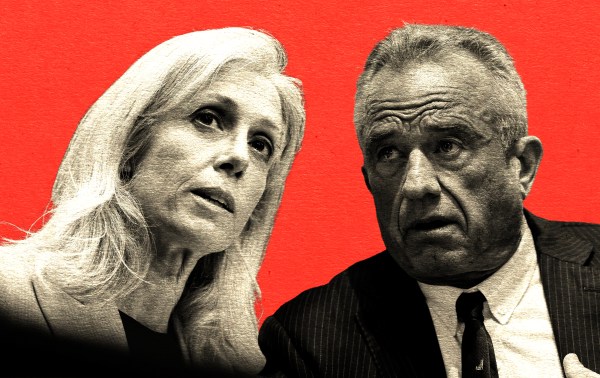As Russia’s conventional military sputters in Ukraine, Vladimir Putin is turning to a familiar tactic to cause trouble for its western neighbor: hybrid warfare.
Moldova, a country of 2.6 million people sandwiched between war-torn Ukraine and NATO member Romania, has been rocked by a series of anti-government protests in recent weeks. Foreign and local officials say they’re part of a broader Russian campaign to overthrow the government and plunge the country into chaos.
Thousands of demonstrators took to the streets of Moldova’s capital of Chisinau this week to call for the country’s Western-friendly government to resign. “Down with Maia Sandu!” they reportedly chanted of Moldova’s president. “Down with the dictatorship!” While many protesters voiced economic grievances—inflation, sky-high energy prices, and other concerns—others demanded that Moldova stay out of the war in Ukraine.
But the former Soviet republic’s involvement in the conflict isn’t an open question. Moldova included permanent neutrality in its 1994 constitution after a war against Russian and local forces three decades ago—vowing not to allow the “dispersal of foreign military troops” on its territory in an apparent bid to dissuade further Russian aggression. The gamble doesn’t seem to be paying off: Without NATO protection or much of a military, Moldova is facing a ground war at its doorstep and destabilizing forces within.
Ukrainian President Volodymyr Zelensky was the first to publicly warn of a brewing Russian plot last month, after Ukraine’s intelligence service allegedly unearthed a detailed scheme to depose the Moldovan government. “A Russian document that shows who, when, and through what actions was going to break Moldova,” he said in a speech before the European Council. “To break the democratic order of this country and establish their control over it.” Moldovan President Sandu—a pro-European Union, anti-corruption campaigner—echoed his warning a few days later, accusing Kremlin-backed “saboteurs” of planning a coup.
Protests have become a regular feature in the country’s capital since, organized in varying degrees by the Pro-Russia Shor Party, which claims that the sitting government is to blame for Moldova’s economic downturn. When the war in Ukraine broke out, Moldova was highly energy-dependent on Russia, which slashed gas exports to Chisinau last year in what officials described as an act of energy blackmail. The Kremlin and its local proxies have capitalized on the growing frustration—and a healthy dose of disinformation—to shift public opinion against the Moldovan government.
The Shor party and its head Ilan Shor, an exiled oligarch convicted of stealing from Moldovan banks, are both blacklisted by the U.S. State Department for their reported ties to Moscow. Sandu is “trying to draw Moldova into a war with Russia,” Shor alleged on Facebook this week. “She is doing everything possible, at any cost, to make blood flow on the territory of the Republic of Moldova, just to keep herself in power.”
Shor’s comments resemble those made just a few weeks earlier by Russian Foreign Minister Sergey Lavrov, who alleged that Sandu is “itching to join NATO” and that the West is “sizing up” Moldova in the hopes of making it the “next Ukraine.”
“In a normal democratic society, it’s totally fine whenever you see political parties in the opposition propagating their own political interests,” said Iulian Groza, Moldova’s former deputy foreign minister and now the director of the Chisinau-based Institute for European Policies and Reforms. “But in the current context in Moldova, it’s more about using the vulnerabilities that the country has with the participation of Russia, to further increase anxiety, to increase popular discontent, and try to direct it in an attempt to destabilize internally.”
Putin may also be sowing the seeds for a more direct military confrontation. In eastern Moldova is a 1,300-mile stretch of land called Transnistria, a breakaway territory bordering Ukraine and home to some half a million people and Russian military assets. Moscow currently has about 1,500 “peacekeepers” and a major Soviet-era arms depot in the internationally unrecognized enclave. In recent weeks Russia has been grandstanding about a planned Ukrainian “provocation” in Transnistria, echoing its own rhetoric about Ukraine weeks before it invaded and raising the specter of a conventional attack.
“The situation is turbulent, it is provoked from outside,” Kremlin spokesman Dmitry Peskov said Monday, accusing Ukrainian troops and “Azov nationalists” of amassing at the border of Transnistria. The Ministry of Defense accused Ukraine of “preparing an armed provocation” against the enclave.
Ukrainian, Moldovan, and Transnistrian authorities have all denied Russia’s claims about a build-up, sparking fear that Moscow may be preemptively covering its tracks for an escalation there.
An attack on Moldova is just one way Putin may seek to exploit European vulnerabilities in an effort to break international support for Ukraine, said Ivana Stradner, a research fellow at the Foundation for Defense of Democracies. It could also be a way to test NATO resolve. “Putin has been trying to show that NATO is a paper tiger for many, many, many years,” she said.
Russian officials may harbor another motivation for their escalatory rhetoric surrounding Moldova and its breakaway territory: destabilizing the country—either through military escalation or the threat of it—in order to distract Ukraine’s military from the war’s eastern front, where its forces are currently concentrated to fight off Russia’s assaults in the Donbas. “Russia wants to disperse Ukraine’s military toward the Western part of Ukraine—toward the region—and that may be one of the reasons why Russians try to incite or try to provoke actions in the Transnistria region,” said Groza.
More pressing than the possibility of an attack on Moldova, Groza argued, is the agitation Russia is sowing internally. “The biggest threat to Moldova today is very much linked to using disinformation and proxies to incite people, to spread fear, and to try to conduct internal activities which would cause destabilization and a change of government,” he said.
Disinformation campaigns are key to Russia’s efforts to subvert its neighbors and restore the Soviet sphere of influence, analysts say, and its information warfare in Moldova long predates its kinetic war next door. But Russian bots and proxies have upped their game since the invasion of Ukraine, systematically planting rumors that the U.S. plans to deploy military assets on Moldovan soil, the government wants to launch a NATO bid, and other lies designed to create a panic in the frontline country. Local political parties and staged protests have been key to those efforts.
“To destabilize the country from within, he does not need jets and tanks,” Stradner told The Dispatch. “We already know Putin’s playbook: acting through a proxy in order to deny his activities.”







Please note that we at The Dispatch hold ourselves, our work, and our commenters to a higher standard than other places on the internet. We welcome comments that foster genuine debate or discussion—including comments critical of us or our work—but responses that include ad hominem attacks on fellow Dispatch members or are intended to stoke fear and anger may be moderated.
With your membership, you only have the ability to comment on The Morning Dispatch articles. Consider upgrading to join the conversation everywhere.